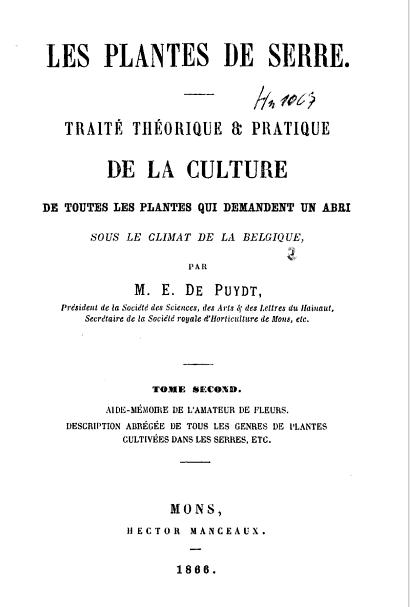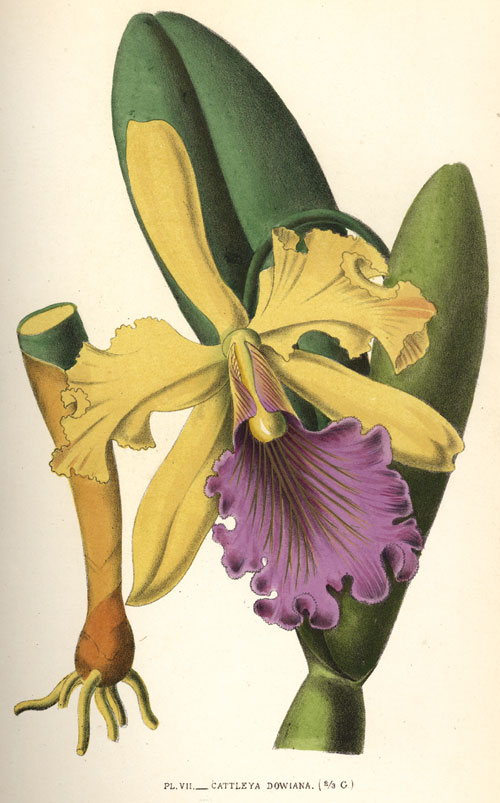Paul Émile de Puydt on:
[Wikipedia]
[Google]
[Amazon]
Paul Émile de Puydt (6 March 1810 – 20 May 1891), a writer whose contributions included work in
Panarchy
, first published in French in the ''Revue Trimestrielle'', Bruxelles, July 1860. A proponent of ''
 ]
* ''Les Plantes de serre, traité théorique et pratique de la culture de toutes les plantes qui demandent un abri sous le climat de la Belgique''. 2 vols, 1866
* ''Les Orchidées, histoire iconographique, organographie, classification, géographie, collections, commerce, emploi, culture, avec une revue descriptive des espèces cultivées en Europe. Ouvrage orné de 244 vignettes et de 50 chromo-lithographies, dessinées d'après nature sous la direction de M. Leroy, dans les serres de M. Guibert'',188
]
* ''Les Plantes de serre, traité théorique et pratique de la culture de toutes les plantes qui demandent un abri sous le climat de la Belgique''. 2 vols, 1866
* ''Les Orchidées, histoire iconographique, organographie, classification, géographie, collections, commerce, emploi, culture, avec une revue descriptive des espèces cultivées en Europe. Ouvrage orné de 244 vignettes et de 50 chromo-lithographies, dessinées d'après nature sous la direction de M. Leroy, dans les serres de M. Guibert'',188
 ]
]

botany
Botany, also called , plant biology or phytology, is the science of plant life and a branch of biology. A botanist, plant scientist or phytologist is a scientist who specialises in this field. The term "botany" comes from the Ancient Greek w ...
and economics
Economics () is the social science that studies the production, distribution, and consumption of goods and services.
Economics focuses on the behaviour and interactions of economic agents and how economies work. Microeconomics anal ...
, was born and died in Mons
Mons (; German and nl, Bergen, ; Walloon and pcd, Mont) is a city and municipality of Wallonia, and the capital of the province of Hainaut, Belgium.
Mons was made into a fortified city by Count Baldwin IV of Hainaut in the 12th century. T ...
, Belgium. His father was Jean Ambroise de Puydt (1758–1836), who was governor of the province Hainaut in the early days of Belgium from 1830 till 1834. In the first marriage of his father there were 6 children. The famous Remi de Puydt came from this first marriage. He is a half brother of Paul Émile de Puydt. Remi de Puydt was a civil engineer and a politician (representative), and he served in the Belgian army as a colonel.
Biography
Paul-Émile was the second child of four children from the second marriage of his father, who married in 1799 Marie Adélaïde Jeanne Michot (c. 1777 – 1858).J-F. de Montigny, Tijdschrift van de Antwerpse kring voor familiekunde, Jaargang IX, 1954, p100-115 As a botanist, Paul Émile de Puydt notably wrote onorchid
Orchids are plants that belong to the family Orchidaceae (), a diverse and widespread group of flowering plants with blooms that are often colourful and fragrant.
Along with the Asteraceae, they are one of the two largest families of floweri ...
s. The standard botanical author abbreviation De Puydt is applied to species
In biology, a species is the basic unit of classification and a taxonomic rank of an organism, as well as a unit of biodiversity. A species is often defined as the largest group of organisms in which any two individuals of the appropriat ...
he described.
After his studies, he turned to journalism and worked as an editor of "L'Observateur du Hainaut".
Together with Henri-Florent Delmotte and Hippolyte Rousselle, he wrote in 1831, the year when the current Belgium became separated from the northern Netherlands, the theatre piece "Le candidat à la royauté: esquisse en trois tableaux mêlés de couplets". This play was performed in Mons in 1831.
He then participated in the government, and he was also director of the Mont-de-piété (Mount of piety
A mount of piety is an institutional pawnbroker run as a charity in Europe from Renaissance times until today. Similar institutions were established in the colonies of Catholic countries; the Mexican Nacional Monte de Piedad is still in operatio ...
) of Mons.
In his free time he was interested in botany, and he developed a pronounced interest in orchids.
Since 1831 he was secretary of the founded ''societé d'horticulture de Mons''. In 1833 he worked on the foundation of the Societé des arts et des lettres du Hainaut, where he was vice-president and, from 1865 onwards, president.
Paul-Émile de Puydt married in 1841 Fanie Catherine Cousin (1819–1905). They had two children: Julien-Vincent-Émile de Puydt (1842–1921) and Philippine-Therese-Marie de Puydt (1843–1892).
As a political economist, he is known as inventor of the concept of people having the freedom to choose which government to join, and governments having to compete for citizens. He has given the name ''panarchy'' to this concept. His paper "Panarchie", was first published in French in the Revue Trimestrielle, in Brussels, July 1860. Panarchie and its author Paul Emile de Puydt was only recently rediscovered.
The notion of competitive government, but then limited to defence, can also be found in the writings of the Belgian economist Gustave de Molinari from 1849, eleven years before de Puydt.
David Hart of the Department of History of Stanford University suggests that Paul-Émile de Puydt might have been influenced by the works of his fellow countryman Gustave de Molinari.
Panarchy
In an 1860 article, de Puydt first proposed the idea of panarchy: apolitical philosophy
Political philosophy or political theory is the philosophical study of government, addressing questions about the nature, scope, and legitimacy of public agents and institutions and the relationships between them. Its topics include politics, ...
that emphasizes each individual
An individual is that which exists as a distinct entity. Individuality (or self-hood) is the state or quality of being an individual; particularly (in the case of humans) of being a person unique from other people and possessing one's own need ...
's right to freely choose (join and leave) the jurisdiction of any governments they choose, without being forced to move from their current locale.P. E. de Puydt,Panarchy
, first published in French in the ''Revue Trimestrielle'', Bruxelles, July 1860. A proponent of ''
laissez-faire
''Laissez-faire'' ( ; from french: laissez faire , ) is an economic system in which transactions between private groups of people are free from any form of economic interventionism (such as subsidies) deriving from special interest groups ...
'' economics, he wrote that "governmental competition" would let "as many regularly competing governments as have ever been conceived and will ever be invented" exist simultaneously and detailed how such a system would be implemented. As David M. Hart writes: "Governments would become political churches, only having jurisdiction over their congregations who had elected to become members." Three similar ideas are "Functional Overlapping Competing Jurisdictions" (FOCJ) advocated by Swiss economists Bruno Frey
Bruno S. Frey (born 4 May 1941 in Basel, Switzerland) is a Swiss economist and visiting professor for Political Economy at the University of Basel. Frey's research topics include Political economy and Happiness economics, with his published wor ...
and Reiner Eichenberger, "multigovernment" advocated by Le Grand E. Day and others, and "meta-utopia" from Robert Nozick
Robert Nozick (; November 16, 1938 – January 23, 2002) was an American philosopher. He held the Joseph Pellegrino University Professorship at Harvard University,
's ''Anarchy, State, and Utopia
''Anarchy, State, and Utopia'' is a 1974 book by the American political philosopher Robert Nozick. It won the 1975 US National Book Award in category Philosophy and Religion, has been translated into 11 languages, and was named one of the "100 m ...
''.
Works
Botany
* ''Traité théorique et pratique de la culture des plantes de serre froide, orangerie et serre tempérées des jardiniers, précédé de notions pratiques de physiologie végétale et de physique horticole, et de conseils pour la construction des différentes serres''. 1860 * ''Les Poires de Mons''. 1860 ]
* ''Les Plantes de serre, traité théorique et pratique de la culture de toutes les plantes qui demandent un abri sous le climat de la Belgique''. 2 vols, 1866
* ''Les Orchidées, histoire iconographique, organographie, classification, géographie, collections, commerce, emploi, culture, avec une revue descriptive des espèces cultivées en Europe. Ouvrage orné de 244 vignettes et de 50 chromo-lithographies, dessinées d'après nature sous la direction de M. Leroy, dans les serres de M. Guibert'',188
]
* ''Les Plantes de serre, traité théorique et pratique de la culture de toutes les plantes qui demandent un abri sous le climat de la Belgique''. 2 vols, 1866
* ''Les Orchidées, histoire iconographique, organographie, classification, géographie, collections, commerce, emploi, culture, avec une revue descriptive des espèces cultivées en Europe. Ouvrage orné de 244 vignettes et de 50 chromo-lithographies, dessinées d'après nature sous la direction de M. Leroy, dans les serres de M. Guibert'',188 ]
]
Social sciences
* '' Panarchy'', first published in French in the Revue Trimestrielle, Bruxelles, July 1860, page 222 to 245 * https://books.google.com/books?id=8SIWAAAAYAAJ * ''La Charité et les institutions de bienfaisance''. 1867 * ''Marche et progrès de la civilisation dans les temps modernes''. 1870 * ''La Grève''. 1876 * ''La Littérature et les Arts, dans leurs rapports avec la morale''. SOCIÉTÉ DES SCIENCES, DES ARTS ET DES LETTRES DU HAINAUT. TROISIÈME SÉRIE. TOME SEPTIÈME. ANNÉE 1871–1872.Novels
* ''Chevreuse, roman''. 1859 * ''Maudit métier, histoire du Borinage''. 1883 * ''Cent mille francs de dot''. 1890Other publications
* Biography of his father: ''Biographie de M. Jean-Ambroise De Puydt. 60 p.''SOCIÉTÉ DES SCIENCES, DES ARTS ET DES LETTRES DU HAINAUT. TROISIÈME SÉRIE. TOME HUITIÈME. ANNÉE 1872. * Theatre piece: „Le candidat à la royauté: esquisse en trois tableaux mêlés de couplets“ par Henri-Florent Delmotte, Paul Émile de Puydt, Hippolyte Rousselle, 1831Literature
* Léopold Devillers: ''Puydt (Paul-Émile de)''. In: Académie Royale des Sciences, des Lettres et des Beaux-Arts de Belgique: ''Biographie nationale''. Bd. 18, Brüssel 1905. * C. Rousselle: ''Puydt (de) Paul-Émile''. In: Ernest A. Matthieu: ''Biographie du Hainaut''. Bd. 2, Enghien 1903. * J-F. de Montigny, Tijdschrift van de Antwerpse kring voor familiekunde, Jaargang IX, 1954, p100-115References
External links
* {{DEFAULTSORT:De Puydt, Paul Emile 1810 births 1891 deaths 19th-century Belgian botanists Belgian economists Belgian writers in French Botanists with author abbreviations People from Mons Walloon people